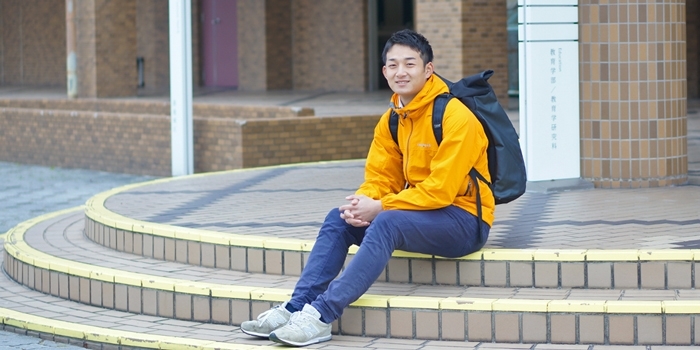
1st year, Cluster 5 (Fundamentals for Education and Human Development), Faculty of Education
Tomohiro Tani
<Graduated from Kyoto Kyoei Gakuen Senior High School>
“HU Student Voices” gives our prospective students an insight into the perspectives of HU students. As the 22nd interview in this series, we talked to Tomohiro Tani, 1st year student in the Faculty of Education (Cluster 5: Fundamentals for Education and Human Development course).
Mr. Tani entered the Faculty of Education because he wants to become a teacher that truly cares and thinks about his students beyond just teaching class, including their club activities and lives outside of class. We interviewed him about what it was like preparing for the university entrance examinations, classes at Hiroshima University, and campus life.
Why did you decide to apply for Hiroshima University?
I look up to my junior high school homeroom teacher. He was not only skilled in teaching, but he was also very good at interacting with students. I started to want to become a teacher like him one day, and started thinking about pursuing Education in university. I decided to apply for Hiroshima University because Hiroshima University is famous for their education faculty.
I believe your course, “Fundamentals for Education and Human Development” is not exactly a course for teacher training. Why did you choose this course when you want to become a teacher?
The Fundamentals for Education and Human Development course allows you to learn about theories, philosophy, and systems regarding education from various aspects. I chose this course because I wanted to acquire specialized knowledge and also wanted to think about “What truly is Education?” before becoming a teacher.
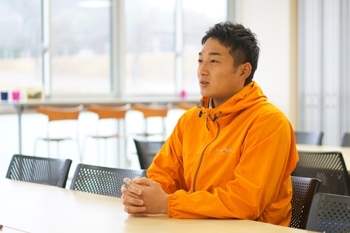
Mr. Tani says, “I applied for the Fundamentals for Education and Human Development course to think about education from various aspects”
Did you apply for private universities?
Yes, I applied for three private universities in Kansai area.
When did you start preparing for the university entrance examination?
I started preparing after I retired from club activities. I started seriously preparing for the examinations after my last tournament, which was around June of my third year.
How did you like to study?
I didn’t go to prep schools or cramming schools, and mostly studied at the school or the library. In the morning, I studied about an hour before class, and studied at the school after class until 7pm. Then I went to the study area in the library and studied there until the closing time at 10pm.
What did you especially put effort into?
I especially put effort into summarizing long Japanese and English passages. Reading comprehension skills is needed because in order to summarize well, you need to read while paying attention to the structure of the passage. I summarized many long passages to increase my reading comprehension skills. Hiroshima University’s English subject examination has summarizing questions, and it’s one of the most difficult parts. I’m thinking that most students face difficulty for these types of questions. By getting better at summarizing, I became more confident. I felt, even if my test score for the National Center Test turns out mediocre, I could make a turnabout in the second round of the exam.
I see you mostly focused on studying for the second round of exams. What troubles did you face while studying?
I faced difficulty in World History and Modern Social Studies subjects of the entrance examination. I’m not very good at subjects that require memorization. After receiving the advice, “Read history like a story”, I committed less on memorizing historical events one by one. I decided to read my textbook over and over again as if it was a story. Maybe because of this technique, I was able to increase my actual exam score by more than 30 points compared to the last mock exam score.
Preparing for the examination is not a short process. How did you keep yourself motivated for the long stretch of time?
I have a pretty optimistic personality, so even when my mock exam score went down, I kept thinking, “I’ll be okay” because taking the actual examination with an anxious mind would be the worst situation. Rather than looking at my mock exam score and pessimistically think, “I only got ___ points”, I kept in mind to calmly perceive the abilities I already had at that moment.
Also, I was the goalkeeper on the soccer team and that means one wrong action by me could cost my team the game. I was always dealing with high pressure during games. Maybe from my experience of being a goalkeeper, I didn’t feel much pressure when I was preparing for the university exam.
Did you participate in Hiroshima University’s open campus?
Yes, I did. There were many well-planned activities and it had a fun atmosphere. There were also opportunities to ask Hiroshima University students about their campus life, so it was a great opportunity for me.
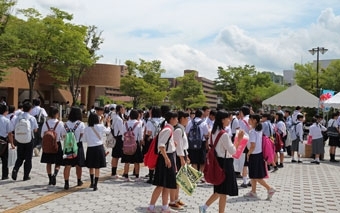
Open Campus around the Faculty of Education
And you successfully passed the entrance exams! How has your impression changed since you started university?
8 different faculties including the Faculty of Education are located on Higashi Hiroshima campus so there are many students at the campus. I think one of the great things about Hiroshima University is that you can meet so many different kinds of people. There are many opportunities for me to interact with students from other faculties outside of my circle and classes.
Please tell me a class that you took that you thought was interesting.
I really enjoyed the class, “Nuclear experience and representation/literature” which is one of the “Peace subjects”. In class, we read pieces of work by writers and poets who have experienced the atomic bomb, and analyzed the content. I want to become a language arts (Japanese) teacher, so I am interested in literature classes.
Regarding specialized classes in my course, Professor Yasushi Maruyama‘s class, “Philosophy of Education” left an impression on me. At first, I thought we were going to learn about different philosopher’s thoughts about education, but actually in class, the students philosophized about education. First we would read an article about education, and write a critical essay. The essays are projected on the screen, and students discuss about the contents of the essay. I feel my ability to think proactively and state my opinion improved because the professor wasn’t one-sidedly teaching knowledge.
Professor Maruyama is our grade level’s tutor*. He remembers everyone’s names like a High school homeroom teacher, and talks to us in a friendly way like, “Oh, did you cut your hair?”
*Tutor System
A tutor is a faculty member assigned to provide you with guidance and supports concerning all aspects of university life, from the time students enter, through to their graduation. Students can consult tutors not only concerning matters relating to the subjects they are taking but also concerning all aspects of university life, including worries about learning and ways of using the facilities on campus.
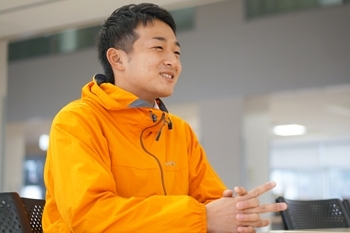
Mr. Tani says, “There are many interesting general education classes and specialized classes”.
It has almost been a year since you entered university. Are you experiencing the campus life you imagined?
I feel I am spending productive days. In the Fundamentals for Education and Human Development course, you can graduate without obtaining a teaching certificate. For students like me that want to obtain a teaching certificate, we need to take extra classes from other courses so there is great deal of things to study.
Also, we have loads of interaction beyond grade levels in my course. For example, recreations like softball competitions. Soon after entering university, there was an orientation camp. We were split into groups and had a debate. For my year, we debated about themes like, “Should Japanese History be a compulsory subject?”, “Should we cancel AO entrance examinations?” and “Pros and Cons of Free Schools”. Preparing for the debate required tons of work, but it was a fulfilling experience because I was able to think about problems in education with friends that share the same ambitions as I.
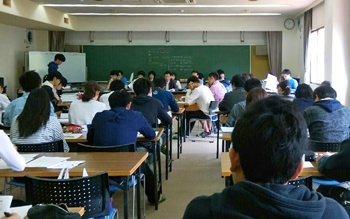
Debate during the Orientation Camp
Do you take part in circle activities or a part-time job?
I have been doing soccer until High school, so I joined a soccer circle. There are about 4 practices per week and sometimes there are competitions on the weekends.
I am working once or twice a week as a cram school teacher as a part-time job. I am mainly teaching junior high and high school students.
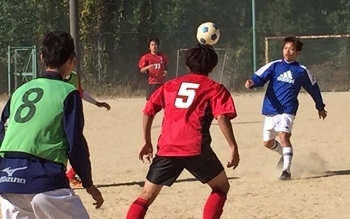
Practice on the university campus ground
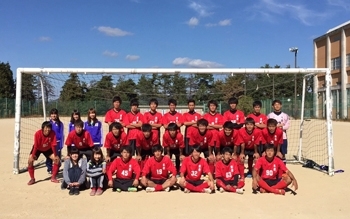
Members of the Shinonome Soccer Club
What other things would you like to challenge yourself in the future?
I chose Chinese as my second foreign language. I liked Chinese writing even before entering university, and I still really enjoy studying Chinese. In the future, I want to challenge myself to take the Chinese language test and/or study abroad to China.
What are your future goals?
I realized that I have other career options like working for a private company or working as a government officer after entering university. However, I still want to become a teacher. My will to become a teacher like the teacher I admired in junior high school has gotten even stronger. I am striving to become a teacher that truly cares and thinks about their students. A teacher that goes beyond just teaching class, and thinks about their student’s club activities and lives outside of class.
Lastly, please give a message to students thinking about entering Hiroshima University!
Hiroshima University is a great environment to focus on studying! It’s not a glamorous place like big cities, but for people that feel, “I want to definitely study this” or “I want to try my best in this”, I think Hiroshima University is perfect for you.
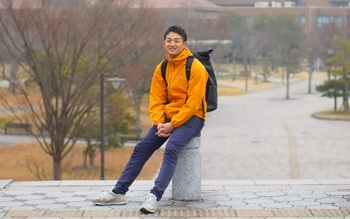
January 5, 2016
Report: Public Relations Group (G, F, i)
Location: Student Plaza, around the Faculty of Education


 Home
Home





